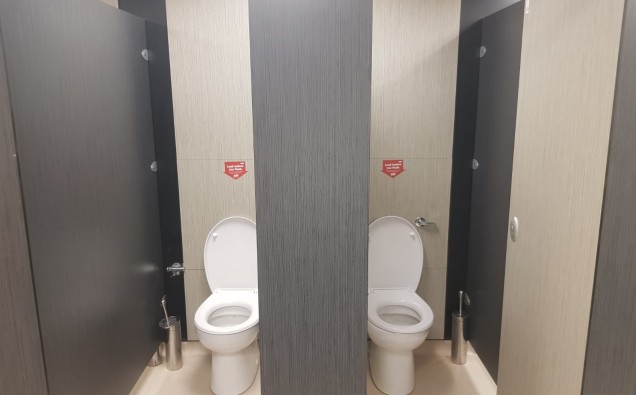Places of worship in the East Midlands encourage their members to ‘look before they flush’ in support of the latest Be Clear on Cancer campaign
Over 200 places of worship in England are supporting the latest ‘Be Clear on Cancer’ campaign by displaying posters in their toilets
Places of worship encourage their members to ‘look before they flush’ and tell their doctor if they notice blood in their urine, even if it’s just once
Blood in urine is a key symptom of bladder and kidney cancers
Every year around 19,100* new cases of bladder and kidney cancers are diagnosed in England; causing around 8,000 deaths
Public Health England’s (PHE) latest national ‘Be Clear on Cancer’ campaign highlights blood in urine as a key symptom of bladder and kidney cancers. The campaign encourages everyone to ‘look before they flush’ and visit their GP without delay if they notice blood in their urine, even if it’s just once.
In the last two weeks over 200 places of worship including temples, gurdwaras, churches and mosques in the Midlands and Manchester area have lent their support to the campaign by displaying posters in their toilets that drive home the importance of checking for blood in urine before flushing the toilet.
Blood in urine is a symptom in almost two thirds (64%)1 of all bladder cancers and around a fifth (18%)2 of kidney cancers. Blood might not appear every time, so it is important that people seek medical help even if they notice it just once.
A new survey reveals that only 16% of adults aged 50 and over in England (those most at risk of these cancers) say they check the colour of their urine every time they go to the toilet, with women being less likely to check every time (12% vs. 20% of men).
Latest figures show that every year in England around 19,1004 people are diagnosed with bladder or kidney cancer and around 8,000 people die from these diseases.5 Early diagnosis is critical; 84% of those diagnosed with kidney cancer and 77% of those diagnosed with bladder cancer at the earliest
* Based on average annual data for 2012 – 2016 diagnoses
News Release
(stage 1) will live for at least five years. 4,5,† At a late stage (stage 4), this drops to 10% and 9% respectively. 4,5,†
Professor Julia Verne, from Public Health England said: “It is vital that people know that blood in urine could be a sign of cancer.
“We’re very pleased that over 200 places of worship are supporting our campaign. It’s an important partnership that is helping us to ensure that we get this message out across all sections of society and in places that are central to people of faith.
“Our research shows only a small number of people check the colour of their urine every time they go to the toilet. People need to get into the habit of looking before they flush to spot any signs of blood in their urine. And if there is blood, they shouldn’t hesitate about going to their GP. This will help diagnose more people at the early stages, when cancer is more treatable – improving their chances of living longer.”
Nadeem Haider, Community Development Officer, Muslim Community Organisation (MCO), Nottingham said: “We fully support the Be Clear on Cancer campaign and are pleased to encourage our members to be vigilant to changes in their body and to check their urine. Displaying posters in our toilets is an innovative way to ensure we get the message across to members of our community.
“We also encourage our members not to delay seeking medical advice if they notice any blood in their urine, even if it’s just the once.”
Management Committee, Gurdwara Baba Budha Ji, Nottingham said:
“We are very pleased to be supporting a campaign that aims to help people recognise the symptoms of bladder and kidney cancer by taking the message to the heart of the community. We hope that our members and visitors will share the campaign with friends and family so that more people can become aware of what to look out for and see their doctor if they are concerned.”
For further information about the signs and symptoms of bladder and kidney cancer, search ‘Be Clear on Cancer’.
















